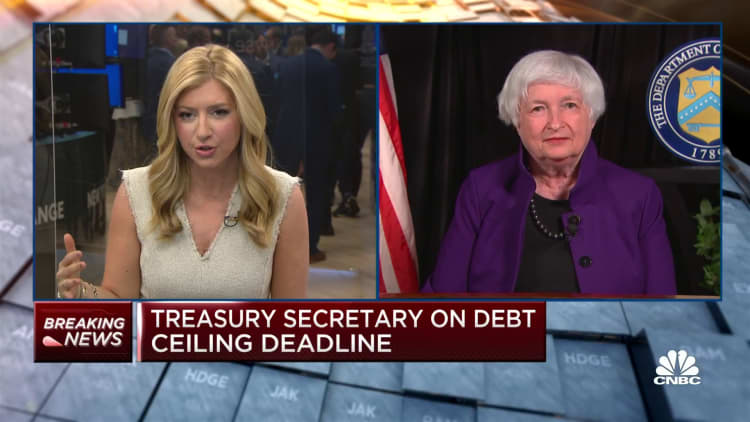[ad_1]

WASHINGTON — Failure to raise the U.S. debt ceiling would cause an “economic catastrophe,” Treasury Secretary Janet Yellen said Monday.
“That is something that could produce financial chaos, it would drastically reduce the amount of spending and would mean that Social Security recipients and veterans and people counting on money from the government that they’re owed, contractors, we just would not have enough money to pay the bills,” Yellen told CNBC’s “Closing Bell: Overtime.”
Yellen’s comments came as a political stalemate over raising the debt limit was forcing the Treasury Department dangerously close to a worst-case scenario: a potential U.S. debt default. This would occur if Treasury were to exhaust the extraordinary measures it implemented earlier this year to meet its obligations after the U.S. reached its statutory debt limit of $31.4 trillion.
In order to avoid a default on the nation’s debt, Congress must vote to either raise or suspend the debt limit before Treasury runs out of emergency funding. But with only eight days left this month during which both the House and the Senate are scheduled to be in session at the same time, time is running out to reach a deal.
“There’s a very big gap between where the president is and where the Republicans are” on raising the debt ceiling, Yellen said.
U.S. Treasury Secretary Janet Yellen takes questions on the Biden administration’s plans following the collapse of three U.S. lenders including Silicon Valley Bank and Signature Bank, as she testifies before a Senate Finance Committee hearing on U.S. President Joe Biden’s proposed budget request for fiscal year 2024, on Capitol Hill in Washington, March 16, 2023.
Mary F. Calvert | Reuters
Treasury and the Congressional Budget Office both released new reports last week predicting that extraordinary measures could be exhausted as early as June 1, which was sooner than Wall Street or the White House had been expecting. The new, earlier date was the result of lower-than-expected federal tax revenues in April.
On Tuesday, Biden will host a high-stakes meeting at the White House with the four top leaders of Congress: House Speaker Kevin McCarthy, R-Calif., House Minority Leader Hakeem Jeffries, D-N.Y., Senate Majority Leader Chuck Schumer, D-N.Y., and Senate Minority Leader Mitch McConnell, R-Ky.
The White House says the meeting will not include negotiations on raising the debt limit, which Biden says Republicans must agree to raise without preconditions. So far, Republicans have refused to approve a debt ceiling hike unless it is accompanied by sweeping cuts to federal spending.
Economists on both sides of the aisle agree that even a very brief default would send shock waves through equities markets and send interest rates soaring.
“Short-term funding markets, which are essential to the flow of credit that helps finance the economy’s day-to-day activities, likely would shut down as well” in the event of a default, said Mark Zandi, chief economist of Moody’s Analytics, at a Senate hearing in March.
The looming debt ceiling crisis has also forced Yellen to “compress” her trip to Japan this week. She is scheduled to attend a meeting of G-7 finance ministers and central bankers.
Yellen’s core priorities for the summit will be “strengthening the global macroeconomy, redoubling our commitment to Ukraine as it defends itself against Russia’s barbaric war and third, our work to bolster economic resilience and security,” the Treasury Department said in a statement Friday.
Behind the scenes, the secretary is also likely to face questions from her G-7 counterparts about the debt ceiling debate and the prospect of a U.S. default. “If we were to compromise the credit rating of the United States, and even worse to default on the debt, I think that would have an adverse impact on the dollar’s use as a reserve currency,” Yellen told CNBC.
“The dollar is regarded as the bedrock, safe asset in the entire global financial system. It’s trusted, and it is the ultimate safe asset and a failure to raise the debt ceiling, impairing the U.S. credit rating, would put that at risk,” she said. “So that is a real concern.”
[ad_2]
